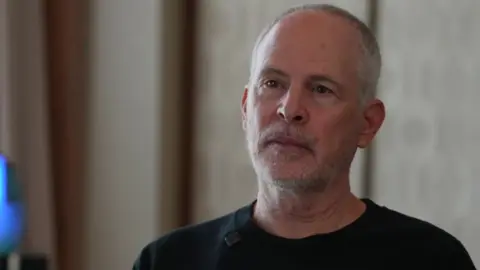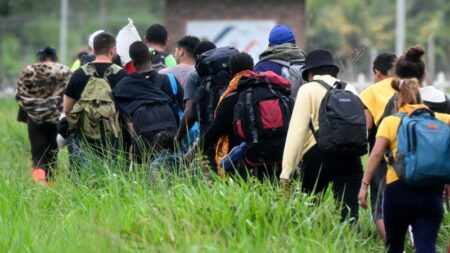In a recent interview, Keith Siegel, a former hostage released after a prolonged captivity by Hamas, articulated a compelling message urging former President Donald Trump to leverage his influence to secure the release of other captives still held in Gaza. Siegel captivates audiences with his harrowing story of survival—a narrative underscored by loss, suffering, and hope.
Siegel, aged 66, was abducted from Kibbutz Kfar Aza during the violent Hamas-led incursion into Israel on October 7, 2023. His release came after 484 days of captivity under a ceasefire agreement orchestrated by Trump, who had recently assumed office. Alongside him was his wife, Aviva, who experienced her own harrowing ordeal, being held captive for 51 days before her eventual release during an earlier truce.
As an American-Israeli, Siegel’s plight and subsequent freedom grant him unique insights into the dynamics of the ongoing conflict. He shared his perspective during an interview conducted ahead of a crucial meeting between Israeli Prime Minister Benjamin Netanyahu and President Trump at the White House. This meeting was particularly significant, attended by representatives aiming to negotiate peace amidst the ongoing warfare.
During the discussion, Siegel expressed gratitude towards Trump for facilitating his own release and voiced hope that the former president could work similarly towards securing the freedom of the remaining hostages—approximately 50 individuals, of whom up to 20 may still be alive. Siegel emphasized, “I believe he has a lot of strength, power, and ability to put pressure on both sides to reach a deal and bring all the hostages home while extinguishing the war.” This remark encapsulates the urgency that Siegel feels regarding the situation and highlights his belief in diplomatic intervention.
As Trump indicated a desire to see a new ceasefire and hostage release arrangement finalized shortly, challenges persisted. Negotiations between Israel and Hamas had resumed via indirect talks in Qatar, yet were reported to have stalled after only three hours. The lack of a breakthrough underscores the deep-seated complexities involved in such negotiations.
Before his flight to Washington, Netanyahu expressed optimism about his imminent discussions with Trump, hinting that the meetings could significantly contribute to advancing peace efforts. The proposed strategy outlined for negotiation included a staggered release of living hostages and the return of deceased individuals held by Hamas, in exchange for Palestinian prisoners incarcerated in Israeli jails.
Interestingly, two sides appeared polarized. While Hamas claimed to have issued a “positive response” to the negotiations, Palestinian officials revealed that further amendments, including requests for guarantees against the resumption of violence, were necessary for the continuation of discussions—a condition previously dismissed by Netanyahu. This back-and-forth exemplifies the fragility of agreements amid conflicting interests.
Siegel’s description of his imprisonment is both harrowing and vivid, as he recounted the physical and psychological torment inflicted by his captors. His navigational journey through Gaza involved being shifted between 33 locations, daily instilling a sense of peril and uncertainty as he witnessed the inhumane conditions faced by fellow prisoners. The former hostage sharply condemned Hamas, advocating for the necessity of their disempowerment to restore peace: “It is of the highest priority and urgency to get all of the hostages back as soon as possible.”
Furthermore, he poignantly acknowledged the suffering of Gazans caught in the crossfire, invoking the concept of universal human rights—advocating for a future where “peace and security for all people” thrive.
As the death toll rises owing to the conflict—reportedly exceeding 57,000 according to Gaza’s Hamas-run health ministry—the urgency for resolution has never been more pronounced. Siegel’s plea is not merely for the release of hostages but for a broader discourse on fostering mutual respect, enduring peace, and addressing the humanitarian crisis impacting all involved parties. His compelling narrative serves as a vital reminder of the human toll that transcends political boundaries—an urgent call for empathy and action in the wake of relentless suffering.











